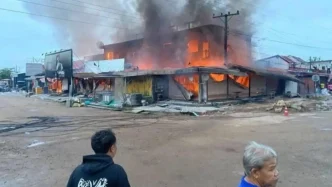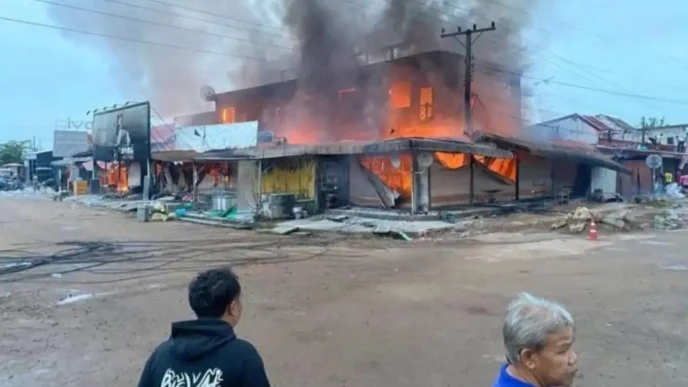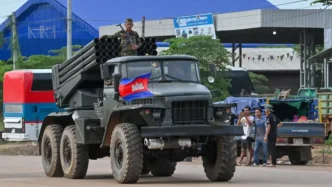A late-night collision between two speeding tuk-tuks on a bustling Bangkok street has left three people seriously injured, raising fresh concerns about road safety and the regulation of these iconic vehicles. The accident, which occurred around 10pm on Monday on Ratchadaphisek Road in Chong Nonsi subdistrict, Yannawa district, has prompted police to investigate whether the drivers were racing at the time of the crash.
According to eyewitnesses, who are local residents, the two tuk-tuks appeared to be competing to overtake each other. One of the vehicles attempted to change lanes while overtaking on the right, leading to a collision that caused it to flip over. The driver of the overturned tuk-tuk, identified as 28-year-old Pichit, sustained a severe head injury, including a deep cut, and was rushed to a nearby hospital. The driver of the second tuk-tuk and his passenger both suffered broken legs and are also receiving medical treatment.
Pol Lt-Col Thiradej Sonklin, an inspector at Bang Phong Phang Police Station, confirmed that authorities are looking into the circumstances of the incident. “We are still investigating the reason behind what appears to be a race between the two drivers,” he said. Police are awaiting the results of blood alcohol tests for all three individuals involved to determine if intoxication played a role in the crash.
A Symbol of Bangkok Under Scrutiny
Tuk-tuks, also known as auto-rickshaws, are a beloved symbol of Bangkok’s vibrant street culture. With their open-air design and compact size, they offer tourists an unobstructed view of the city while navigating its notoriously congested streets and narrow alleyways. Their manoeuvrability has made them a popular choice for short trips, particularly among foreign visitors seeking an authentic experience. However, this latest incident has cast a spotlight on the safety risks associated with these vehicles, especially when drivers engage in reckless behaviour.
Road safety remains a persistent challenge in Thailand, where traffic accidents claim thousands of lives each year. Bangkok’s chaotic streets, often clogged with a mix of motorbikes, cars, and public transport vehicles, can be particularly hazardous. Tuk-tuks, while agile, lack the protective features of enclosed vehicles, leaving drivers and passengers vulnerable in the event of a collision. Critics have long argued that stricter regulations and enforcement are needed to curb dangerous driving practices among tuk-tuk operators, many of whom rely on tourist fares for their livelihood and may feel pressured to compete for customers.
Calls for Reform and Regulation
Monday’s accident has reignited discussions about the need for better oversight of tuk-tuk operations in the city. While the vehicles are subject to licensing requirements, enforcement of traffic rules and safety standards is often inconsistent. Some advocates have called for mandatory training programmes for drivers, as well as limits on the number of tuk-tuks operating in high-traffic areas to reduce competition and the temptation to speed or race.
There is also growing concern about the impact of such incidents on Thailand’s tourism industry, a vital pillar of the national economy. Tuk-tuks are often marketed as a quintessential Bangkok experience, but high-profile accidents could deter visitors or tarnish the city’s image as a safe destination. If safety concerns are not addressed, some fear that tourists may opt for alternative modes of transport, such as ride-hailing apps or taxis, which offer greater comfort and perceived security.
A Broader Issue of Road Safety
This collision is a stark reminder of the broader road safety crisis in Thailand. According to the World Health Organization, Thailand has one of the highest rates of road traffic deaths in the world, with motorbikes and other small vehicles often involved in fatal accidents. While tuk-tuks account for a smaller share of these incidents compared to motorbikes, their visibility as a tourist attraction amplifies the public and media attention they receive.
Local authorities have pledged to improve road safety through public awareness campaigns and stricter enforcement of traffic laws, but progress has been slow. In the meantime, residents and visitors alike are left to navigate the risks of Bangkok’s streets, where a moment of recklessness can have devastating consequences.
As the investigation into Monday’s crash continues, the focus will likely shift to whether systemic changes can prevent similar incidents in the future. For now, the three individuals injured in the collision remain in hospital, their recovery uncertain. Their story serves as a sobering reminder of the human cost of road accidents—and the urgent need for action to make Bangkok’s streets safer for everyone.














